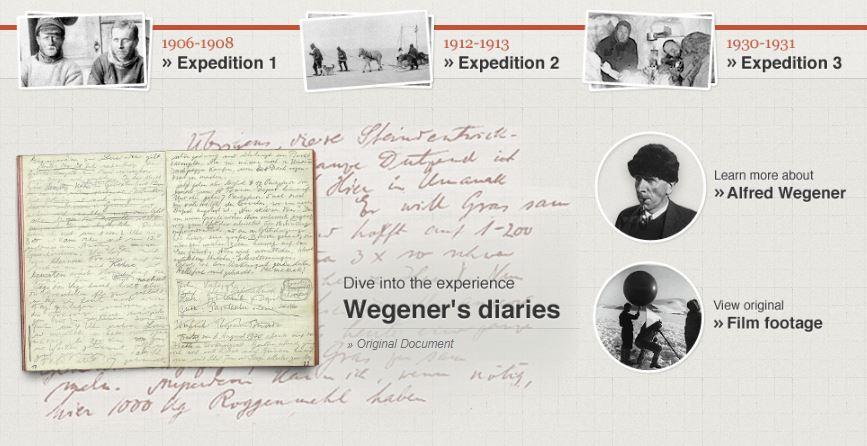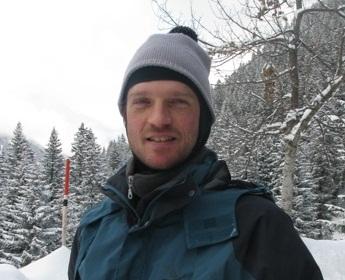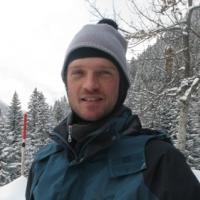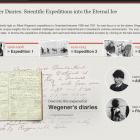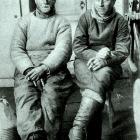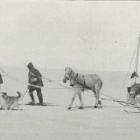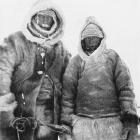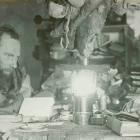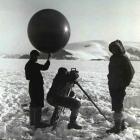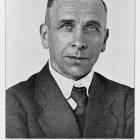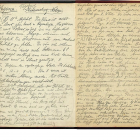Exhibition Overview
Alfred Wegener (1880–1930) became internationally known for his heavily disputed theory of continental drift, which he formulated as early as 1912. Yet his exploration of Greenland, and his related work in glaciology and aerology, also make up a considerable part of his multifarious scientific career as a meteorologist and geophysicist. Wegener’s work focused on gaining detailed knowledge about the origins of Greenland’s weather and climate conditions and the dynamics of its ice sheet. His expedition diaries, which are at the core of this online exhibition, are a crucial document for anyone interested in the history of polar expeditions. His dense and well-preserved diaries provide a detailed look at polar exploration in the first half of the twentieth century, illustrating the challenges of everyday life as well as the continuities and changes in exploration methods over the course of three decades.
Wegener’s original handwritten diaries from 1906–1930 can be found at the Archives of the Deutsches Museum. This virtual exhibition presents the complete digitized diaries, as well as representative excerpts that have been transcribed and translated into English. Wegener’s diaries are remarkably precise, and are written in easily legible handwriting. They encompass the Danish Danmark Expedition (1906–1908), the Danish North Greenland Expedition (1912–1913), and the Wegener-led German Greenland Expedition (1930–1931). The reader can choose individual expeditions and follow the course of events by reading from day to day. Each expedition is introduced by a commentary. Furthermore, the reader will find information on Wegener, a film document with commentary of the 1930–1931 expedition, and links for further reading and research.
The virtual exhibition “Scientific Expeditions Into the Eternal Ice” is a collaboration of the Rachel Carson Center for Environment and Society and the Deutsches Museum. Researched, transcribed and authored by historian Christian Kehrt, the exhibition is based on original archival material from the Deutsches Museum and images from the Deutsches Archiv für Polarforschung of the Alfred-Wegener-Institut Bremerhaven. Christian Kehrt wrote the main commentaries; Dorit Müller contributed the commentary to the film. The transcripts were proofread by Frieder Groninger, translated by Claudia Whiteus and Kerry Jago, and edited by Brenda Black. The digitization of the original archival material was carried out in consultation with Wilhelm Füßl, Matthias Röschner, and Ludwig Schletzbaum. The exhibition was coordinated by Felix Mauch with assistance from Andreas Grieger and the Environment & Society Portal team and its partners.
About the author
Christian Kehrt works in the fields of environmental history, military history, and the history of science and technology. He studied history and philosophy in Tübingen and Stony Brook, NY. His PhD “Moderne Krieger. Die Technikerfahrungen deutscher Militärpiloten, 1910–1945” deals with flying experiences of military pilots in the age of the two world wars. It was completed as part of the postgraduate research program “Technology and Society” at the Technical University Darmstadt and received the Werner-Hahlweg-Prize for military history, the Georg-Agricola Prize and the prize for young scholars of the German Society for Aeronautics and Astronautics. As a postdoc he worked at the Deutsches Museum in Munich on a project on the origins of nanotechnology. In 2009/10 he was a Carson Fellow at the Rachel Center for Environment and Society. Currently he is pursuing a habilitation project on polar exploration in the period of the Cold War at the Helmut Schmidt University in Hamburg where he holds a position as a research associate.


